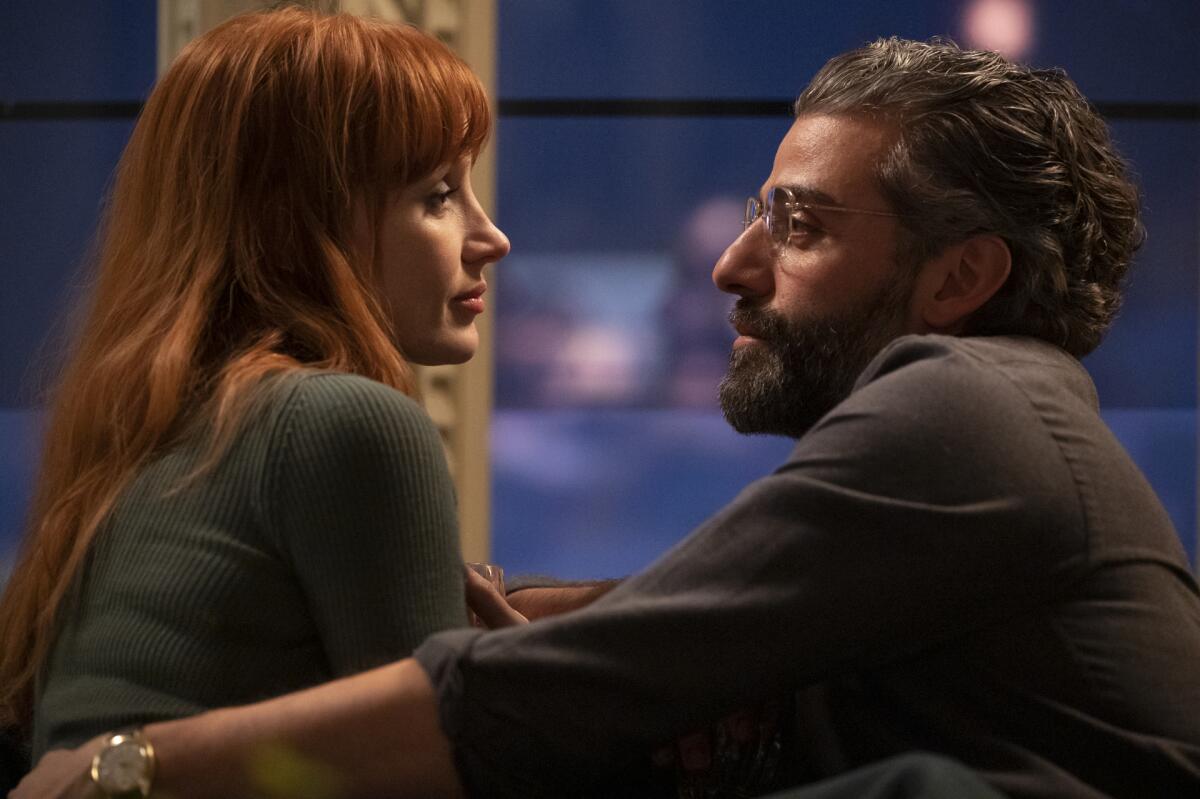Why Oscar Isaac saw the ‘Scenes From a Marriage’ two-hander as one role

When newly minted Emmy nominee Oscar Isaac was first approached by writer-director-producer Hagai Levi to possibly play husband Jonathan in his HBO reimagining of Ingmar Bergman’s 1973 “Scenes From a Marriage,” the “Dune,” “Star Wars” and “X-Men” star wrote to his longtime pal Jessica Chastain — whom he’d studied alongside at Juilliard some two decades prior, and with whom he’d co-starred as husband and wife in 2014’s “A Most Violent Year.” If the project did end up coming Isaac’s way, she was the person he’d want as his Mira.
With Chastain initially unavailable, the role went to fellow Oscar winner Michelle Williams. Scheduling snafus ensued, Williams bowed out and Chastain — now unencumbered — jumped in. Had Williams remained attached, the entire limited series would have had a much different tenor, both for audiences and for Isaac himself.
“There obviously would have been a lot more work,” says Isaac during a video call logged from the tiny seaside island town of Tisvilde, Denmark, north of Copenhagen, where he has a home with his wife, Danish writer-director Elvira Lind. “I don’t know [Michelle]. Getting to know somebody, getting to understand them as a person, as an actor and all that. We didn’t have that with Jessica, with our having so much history together.”
In what would amount to a veritable workplace roller coaster, joint trust was paramount for both actors. “Sets are crazy places” Isaac says. “The whole job is insane. It can breed a lot of bad habits, bad behavior, carelessness, selfishness. People get so ambitious that they just wanna do their thing at whatever cost. And so, the fact that she and I had trust in each other, our kids play together, you know, it’s just a completely — for better and worse — a completely entwined relationship.”
That’s why Isaac maintains he never envisioned the pair as having separate roles. “It’s not really two performances, it’s one performance,” he says. “We’re performing the character of a marriage. I wasn’t even that interested in the character. It was the situations that, for me, were really harrowing. So, I didn’t even put too much stock into like, ‘Well, how does he sound? What does he do?” The meat of it was just being in those situations and then being synchronized with another human being, as the characters, but as the performers as well. It was like music, just total synchronization. Micro-expressions. Any slight movement she would make, I would counter emotionally, physically. That was unlike anything I’ve ever experienced. It was scary, too, because you’re kind of operating at a really subconscious level.”
In this five-part two-hander rife with painfully raw moments, Isaac says Episode 2 was his most taxing. “A lot of it was just having to listen to earth-shattering news for days and days at a time,” he recalls. “The kind of attention that requires, the mix between focus and also trying to allow for spontaneity to occur, but to not force things. It was a tightrope walking that, when she comes home with the news that she’s having an affair and she’s leaving. Those were just energetically, probably, the most challenging.”
His favorite scenes? “I really loved driving around in the car with her,” he says. “Because we finally got out in the streets. We would just play music and drive around together.”
The parity in the pas de deux these friends performed extended to the nudity on display, what with Chastain requesting a quid pro quo from her co-star regarding that piece of the production. The condition never fazed Isaac.
“It was always in the script,” he says. “I always assumed there would be nudity because they’re having sex, and people are usually somewhat naked when they have sex. At least, that’s the way I’ve done it.”
By the same token, Isaac says he understands the reticence other male actors may have about baring their body. “I think it’s OK if people are squeamish about showing their genitals,” he says. “I’m not so squeamish about it, but I get it. America’s funny with that stuff. You can chop lots of heads off, you can shoot everybody, you can have all the blood flowing, but you know, if you see a nipple, everyone freaks out. Because of that, it’s a hypersexualized society. The repression of it just creates so much over-sexualization of kids. And yet, the more adult, real bodies — what bodies actually look like — that’s the thing that gets people all weirded out. It’s weird.”
While Isaac and his family are taking some well-deserved time off in Denmark — “I’m just in heaven up here,” he says — Mad Gene Media, the production company he and Lind recently launched, has a few film and TV projects in development. Come September, he’ll obviously again be stateside for the Emmy ceremony.
Isaac says it’s “lovely and fun” to be nominated, especially alongside much-admired fellow performers. It definitely puts a smile on his face. Still, “I don’t put a ton of meaning into necessarily being included, because there are so many reasons why some people make the cut and some people don’t,” he adds. “It’s absurd that [Jessica] isn’t nominated, and it’s also absurd that I am nominated. The whole thing’s a little bit absurd, and that’s fine. So is life.”
More to Read
From the Oscars to the Emmys.
Get the Envelope newsletter for exclusive awards season coverage, behind-the-scenes stories from the Envelope podcast and columnist Glenn Whipp’s must-read analysis.
You may occasionally receive promotional content from the Los Angeles Times.







